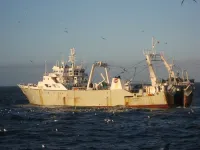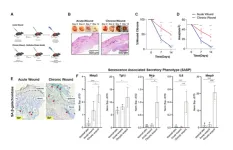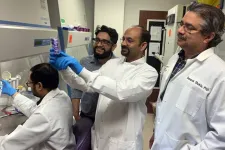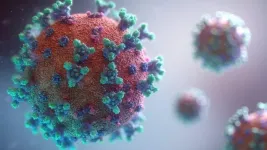(Press-News.org) Fish aren’t impacted by borders, and neither are the subsidized fishing fleets that follow them. A recent UBC study quantified the number of harmful fisheries subsidies that support fishing in the high seas, domestic and foreign waters and found that between 20 and 37 per cent of these subsidies supported fishing in waters outside the jurisdictions of their home nation; these subsidies also primarily originated from developed nations yet disproportionately impacted developing countries, leading to environmental and societal impacts all around the globe.
“Harmful subsidies often lead to a fishing fleet being able to go out fishing even if [the fishing] isn’t profitable,” said Anna Schuhbauer, author of the study and postdoctoral research fellow at the Institute for the Oceans and Fisheries. “And these vessels can go wherever they want —they can go to other countries, other economic zones. And so, we were really interested in the impact of these subsidies on the countries where these boats actually fish.”
Harmful fisheries subsidies are any direct or indirect financial contribution by a government to a private sector that increases the revenue, or lowers the cost, of fishing. Fuel subsidies, tax exemptions, support for vessel construction, investment in marketing and processing infrastructure — by altering the economics of fishing in these ways, harmful subsidies can encourage unsustainable fishing capacities that exponentially increase the risk of exploitation.
In 2018, an estimated $22.2 billion in harmful fisheries subsidies were provided to the world’s fishing fleets. Of this, some $5.3 billion were likely to support fishing in foreign waters and within the exclusive economic zones of foreign nations, and $1 billion supported fishing in the high seas. These numbers mean that the benefits, and the resulting environmental and societal costs, of these subsidies are not equally distributed across the places these fishing vessels go to.
“What we're finding out is that harmful fishing subsidies create more inequities in places where the coastal communities are already marginalized,” said Schuhbauer. “You have coastal communities that are already disadvantaged over the big industrial fisheries because the government doesn't really pay too much attention to them.”
“And we’re not saying that the small-scale fishing fleet should get more subsidies, but maybe the harmful subsidies should be taken away and instead, provided as beneficial subsidies. Maybe for community-based projects or just generally for fisheries management for both industrial and small-scale fleets,” Schuhbauer said.
[caption id="attachment_24260" align="alignright" width="620"] Industrial fishing in Falkland Islands © Anna Schuhbauer[/caption]
Local fishing suffers when big boats, harmfully subsidized, take all the fish and livelihood opportunities away from local fishers. Food insecurity becomes an issue as well, especially for communities heavily reliant on day-to-day subsistence fishing. Artificially created jobs lead to an economy falsely dependent on fishing, where the government does not support creating different, sustainable livelihood opportunities.
“Both current and future generations of marginalized communities in the Global South are heavily impacted by harmful fisheries subsidies,” said Rashid Sumaila, University Killam Professor and Canada Research Chair at the Institute for the Oceans and Fisheries. “There is a huge opportunity cost when limited public resources are used to subsidize overfishing because the same resources are not available to tackle some of the big challenges facing these communities such as building and running community health centres, and schools.”
“Secondly, because such subsidies lead to overcapacity and overfishing not only by local but also subsidized vessels of distant water fishing nations, they literally take food out the mouth of both current and future generations of these communities.”
The ecological impact of these harmful fisheries is also great, and should not be underestimated. Instead of addressing the lack of fish in domestic waters, harmful subsidies allow fishing vessels to deplete fish stocks in other countries’ waters.
“Harmful fisheries subsidies can have many serious impacts,” said Daniel Skerritt, lead author of the study and a former postdoctoral research fellow at the Institute for the Oceans and Fisheries, who is now with Oceana. “Our previous research, and that of colleagues all over the world, have shown how they can distort markets and contribute to unfair trade practices, lead to higher CO2 emissions by making fuel cheaper, and ultimately increase the risk of overfishing.”
Over 20 years ago, the world community recognized how harmful fisheries subsidies were destructive to fish stocks and fishing communities, and asked the World Trade Organization (WTO) to address these issues.
“The mandate was to work collaboratively with countries worldwide to discipline them,” said Sumaila. “The WTO reached an agreement in June 2022 to help reduce these subsidies. At the moment, some commentators have found the agreement wanting.”
The WTO struck a deal in June last year that partially banned provision of fisheries subsidies, but only to illegal fishing and fishing on overfished stocks. WTO Members will be meeting again in February 2025 to negotiate the parts of the deal that were not included, including the prohibition of all harmful subsidies.
“This is what most voices in the scientific community are in support of,” said Skerritt. “The alternative is to provide support that actively works to increase sustainability and equitability in fisheries, particularly in shared fisheries.”
END
Harmful fisheries subsidies are leading to more fishing vessels chasing fewer fish, resulting in adverse environmental and societal impacts: UBC study
Researchers found that 20 and 37% of harmful fisheries subsidies in the high seas, domestic & foreign waters supported fishing in waters outside the jurisdictions outside the jurisdictions of their home nation
2023-05-01
ELSE PRESS RELEASES FROM THIS DATE:
Obesity associated with increased risk of complications after surgery
2023-05-01
In the United States, almost 74% of adults age 20 and older have overweight or obesity, and of that number almost 42% have obesity.
Not only are overweight and obesity complex and serious diseases, but clinicians and researchers are continuing to learn how they can impact health outcomes – from heart and musculoskeletal health to risk for disease, including cancer.
New research published in the journal SURGERY shows that obesity is also associated with increased risk of complications following surgery, including ...
Research shows that lymph node sampling during kidney tumor surgery is safe
2023-05-01
A longstanding approach to surgeries for children with kidney tumors has been an abundance of caution.
While a growing body of evidence demonstrates that children who have extended lymph node sampling during surgery experience better outcomes, some have questioned whether removing more lymph nodes as part of the cancer staging is worth the risk of side effects such as lymphatic fluid leakage into the abdomen.
However, recently published research shows that pediatric patients who receive more extended lymph node sampling during surgery for Wilms tumor, and other types of pediatric renal tumors, do not experience any more ...
A chronic wound model to investigate skin cellular senescence
2023-05-01
“Here, we report a chronic wound healing model that can be used to decipher the paradoxical role of cellular senescence in acute versus chronic wound healing.”
BUFFALO, NY- May 1, 2023 – A new research paper was published on the cover of Aging (listed by MEDLINE/PubMed as "Aging (Albany NY)" and "Aging-US" by Web of Science) Volume 15, Issue 8, entitled, “A chronic wound model to investigate skin cellular senescence.”
Wound healing is an essential physiological process for restoring normal skin structure and ...
Researchers develop clever algorithm to improve our understanding of particle beams in accelerators
2023-05-01
Whenever SLAC National Accelerator Laboratory’s linear accelerator is on, packs of around a billion electrons each travel together at nearly the speed of light through metal piping. These electron bunches form the accelerator’s particle beam, which is used to study the atomic behavior of molecules, novel materials and many other subjects. But trying to estimate what a particle beam actually looks like as it travels through an accelerator is difficult, leaving scientists often with only a rough approximation of how a beam will behave during an experiment.
Now, researchers at the Department of Energy’s SLAC, the DOE’s Argonne National ...
Internet search trends reflect concerns following Supreme Court health care decisions
2023-05-01
Internet search trends may immediately capture how society seeks information related to reproductive health care, according to new research from Indiana University researchers.
The study, published today in JAMA Health Forum, analyzed internet searches for abortion- and contraception-related terms following the June 24, 2022, ruling by the United States Supreme Court on Dobbs v. Jackson Women’s Health Organization. Researchers found that searches increased much more in states where reproductive health care access was more likely to be immediately restricted following the decision.
“It is still fairly early to see what will be the actual changes in reproductive ...
Having daughters might not move politicians’ votes on women’s issues to the left, after all
2023-05-01
Politicians who are the parents of daughters provide researchers with a “natural experiment” to test how personal circumstances influence legislators’ roll call votes. Research published in 2008, by author Ebonya Washington, showed that members of the U.S. House of Representatives with daughters cast more liberal votes on women’s issues during the period between 1997 and 2005. But another study published in 2019 by researchers Mia Costa et al., covering the period between 2007 and 2017, did not ...
Lee studying how to improve access to disability service information in Virginia
2023-05-01
Myeong Lee, Assistant Professor, Information Sciences and Technology, is leading a study to help people with disabilities and their families in Virginia access information about disability services more easily.
The 2022 Information Access Assessment report by the Virginia Board for People with Disabilities (VBPD) revealed that many people with disabilities and their families struggle to find the necessary information about disability services, even when they actively seek help from service agencies. ...
Herpes study adds to understanding of viral reinfections, how to potentially prevent them
2023-05-01
A new study on herpes infections of the eye from University of Illinois Chicago researchers helps shed light on the question of viral reinfections by identifying a key protein involved in viral reinfections that could be targeted by antiviral drugs.
The UIC team examined how the heparanase protein, which is present in all our cells, affects reinfection from the herpes simplex virus type 1 in mice. They found that inhibiting heparanase activity can protect the eyes from being reinfected. Mice that had their heparanase protein blocked ...
WVU announces drill date for first geothermal, carbon capture and storage data-collection well in West Virginia
2023-05-01
Drilling will start on the West Virginia University geothermal and carbon capture data-collection well during the second week of May, marking a significant step forward in clean energy research in West Virginia.
This will be the first-of-its-kind geothermal study in West Virginia and will collect core samples and temperature data down to a depth of 15,000 feet, critical to testing the potential of geothermal energy in the region. Data also will be gathered on the potential for underground carbon storage in the Appalachian basin — another scientific first in the state.
The project is ...
Occludin protein plays key role in spread of coronavirus throughout body’s cells
2023-05-01
COLUMBIA, Mo. -- While the coronavirus continues to infect people around the world, researchers at the University of Missouri have identified a specific protein inside the human body that plays a critical role in how the virus spreads from cell to cell after infection — a discovery that will help better understand the COVID-19 disease and could lead to the development of new antiviral drugs in the future.
The finding provides new insight into how the protein, known as the occludin protein, serves as a mediator for cell-to-cell transmission ...
LAST 30 PRESS RELEASES:
Korea University, Stanford University, and IESGA launch Water Sustainability Index to combat ESG greenwashing
Molecular glue discovery: large scale instead of lucky strike
Insulin resistance predictor highlights cancer connection
Explaining next-generation solar cells
Slippery ions create a smoother path to blue energy
Magnetic resonance imaging opens the door to better treatments for underdiagnosed atypical Parkinsonisms
National poll finds gaps in community preparedness for teen cardiac emergencies
One strategy to block both drug-resistant bacteria and influenza: new broad-spectrum infection prevention approach validated
Survey: 3 in 4 skip physical therapy homework, stunting progress
College students who spend hours on social media are more likely to be lonely – national US study
Evidence behind intermittent fasting for weight loss fails to match hype
How AI tools like DeepSeek are transforming emotional and mental health care of Chinese youth
Study finds link between sugary drinks and anxiety in young people
Scientists show how to predict world’s deadly scorpion hotspots
ASU researchers to lead AAAS panel on water insecurity in the United States
ASU professor Anne Stone to present at AAAS Conference in Phoenix on ancient origins of modern disease
Proposals for exploring viruses and skin as the next experimental quantum frontiers share US$30,000 science award
ASU researchers showcase scalable tech solutions for older adults living alone with cognitive decline at AAAS 2026
Scientists identify smooth regional trends in fruit fly survival strategies
Antipathy toward snakes? Your parents likely talked you into that at an early age
Sylvester Cancer Tip Sheet for Feb. 2026
Online exposure to medical misinformation concentrated among older adults
Telehealth improves access to genetic services for adult survivors of childhood cancers
Outdated mortality benchmarks risk missing early signs of famine and delay recognizing mass starvation
Newly discovered bacterium converts carbon dioxide into chemicals using electricity
Flipping and reversing mini-proteins could improve disease treatment
Scientists reveal major hidden source of atmospheric nitrogen pollution in fragile lake basin
Biochar emerges as a powerful tool for soil carbon neutrality and climate mitigation
Tiny cell messengers show big promise for safer protein and gene delivery
AMS releases statement regarding the decision to rescind EPA’s 2009 Endangerment Finding
[Press-News.org] Harmful fisheries subsidies are leading to more fishing vessels chasing fewer fish, resulting in adverse environmental and societal impacts: UBC studyResearchers found that 20 and 37% of harmful fisheries subsidies in the high seas, domestic & foreign waters supported fishing in waters outside the jurisdictions outside the jurisdictions of their home nation








